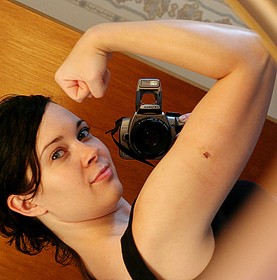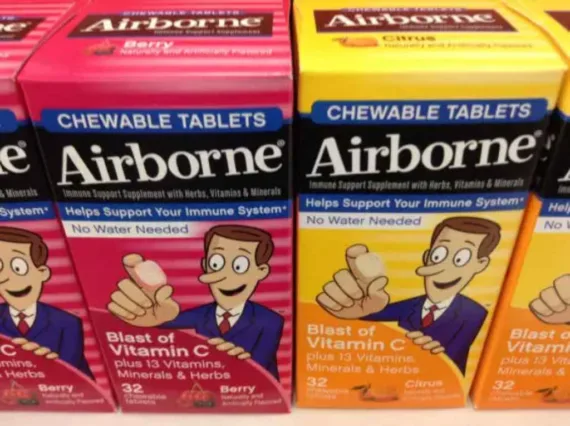Skin cancer is the most common form of cancer in the United States. Presidents get it, and so can you.
One of the most common causes of skin cancer is extended overexposure to direct sunlight.
 The 3 types of cancer that can form on your skin are:
The 3 types of cancer that can form on your skin are:
These types of cancers often develop on a person’s head, neck, or arms.
It’s important to note that malignant melanoma cancer is less common, but more deadly. If not caught early and allowed to spread to other organs, it can be fatal.
Sunscreen should be part of your preventative measures against skin cancer, and it should be incorporated into your daily skin routine. Since overexposure to direct sunlight is the leading cause of skin cancer, this alone is one of the biggest things you can do to prevent skin cancer throughout your lifetime.
Here are the 10 most important things you need to know about sunscreen and skin cancer…
#1 If you have moles, get them checked.
Between 1973 and 2002, the mortality rate from melanoma increased by a surprising 65% in middle-aged men. This is partly due to the fact that men are less likely than women to go to a dermatologist to have their moles checked.
#2You need more than just sunscreen protection.
Sunscreen is important in helping to prevent skin cancer, but more is needed. Avoiding sunlight when it’s at its strongest, wearing long-sleeved apparel, and wearing sunglasses to protect your eyes are all important too.
#3Limit the amount of time you and your children spend in the sun.
Waiting until your sunburn hurts is way past the time to seek shade. A serious sunburn is painful now, but years down the road, it can actually lead to the development of skin cancer.
#4Believe it or not, a higher SPF rating isn’t necessarily better.
The Food and Drug Administration is considering capping SPF ratings at 50. Those high SPF (100+ SPF) and more expensive suntan lotions alone don’t provide the protection necessary to prevent skin damage. What’s more important is to provide complete coverage and maintain that coverage all during the time that you’re exposed to the sun’s rays.
Want to make your own homemade sunscreen?
#5Know the difference between SPF ratings.
You might think that SPF 100 would be twice as good as SPF 50. Wrong! SPF 50 blocks 98% of UV rays, while SPF 100 blocks 99% of UV rays. That’s a pretty petty difference in protection for the huge price difference that you’re likely to find between the two products. Oh, and the old SPF 30 that’s been around forever… it blocks 96.7% of the sun’s harmful rays! For the most part, the more expensive sun blocks are simply hype and advertising. Plus, you need to know how long you can stay in the sun while wearing sunscreen.
#6 It’s best to seek shade, since sunscreen isn’t 100% effective.
In reality, sunscreen should be your second, or even third, line of defense. The fact is, 4 out of 5 name-brand sunscreens offer inadequate protection.
 #7 Apply the proper amount of sunscreen each time.
#7 Apply the proper amount of sunscreen each time.
Most people don’t realize that the proper amount of sunscreen for an adult full-body application is 2 to 3 tablespoons — or about one shot glass full. That means, an entire bottle of sunscreen will only last you a few outings! Remember, if you haven’t covered it, then it’s not protected from the sun. Be sure to wear a hat to protect the top of your head too.
#8 Sunscreen provides a false sense of security.
Though sunscreen may help prevent or even reduce sunburn, it doesn’t necessarily protect you from skin cancer. Since you’re not burning, you may tend to stay out in the sun longer. That extended exposure may lead to skin cancer. On the other hand, without the use of sunscreen you would be more likely to seek shelter sooner.
 #9 Children receive the most sun exposure.
#9 Children receive the most sun exposure.
Up to 80% of your total lifetime sun exposure is likely to take place before you reach the age of 18. Protecting young children will establish a pattern toward a healthy way of life that they will carry with them through adulthood.
#10 Look for the Skin Cancer Foundation Seal of Recommendation.
Over 600 products carry the official seal, indicating they meet or exceed the minimum requirements set by the Foundation as to their effectiveness, moisture resistance, and skin irritation. This seal can also be found on such products as window film and sunglasses.
UPDATE: Internal Sunscreens (Supplements)
These supplements — one is called SunPill — contain potent antioxidants like green tea extract and the fern polypodium leucotomos, which help skin resist sun damage. They’re great insurance, but should be used in conjunction with sunscreen — not as a replacement. These pills prevent damage to skin cells after sunlight hits the skin. Unlike sunblock, where you prevent the sun from producing chemical changes, antioxidants act later to quench the fire that has already started. Source



